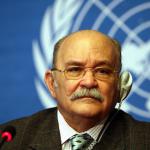Pope Francis Reinstates Revolutionary Nicaraguan Priest

Pope Francis faces the wrath of rightwing conservatives by reinstating a priest who joined the revolutionary, leftwing government of Nicaragua's Sandinistas and once served as president of the UN general assembly.
Pope John Paul II suspended Father Miguel d'Escoto Brockmann from his ministry in 1985, as part of a broader crackdown on adherents of liberation theology – a school of thought he criticised for importing Marxist values into the church. The edict meant D'Escoto was, among other things, forbidden to say Mass.
A brief statement from the Maryknoll religious order, to which the 81-year-old priest belongs, announced that Francis had lifted the suspension on 1 August. "I am happy to be able to celebrate mass again," D'Escoto was reported as saying from the Nicaraguan capital of Managua. "I am really pleased."
A few months ago, he wrote to the pope asking to "be able to celebrate the Holy Eucharist before dying". Bishop Enrico dal Covolo, rector of the Pontifical Lateran University in Rome, told the Italian daily La Stampa that Francis's response did not represent the adoption of a political stance and should be understood in the context of his emphasis on the importance of mercy.
But the rightwing US website Truth Revolt said: "The decision will likely anger most conservative Catholics". Indeed: a comment posted to another conservative site, Free Republic, branded it "a terrible decision and a slap in the face to all true and faithful Catholics".
After the Sandinistas overthrew the pro-American regime of Anastasio Somoza in 1979, D'Escoto agreed to become foreign minister in Daniel Ortega's new government, a post he held until 1990. From 2008 – 2009, D'Escoto served as president of the UN general assembly.
In the 1980s, the Sandinistas accused the CIA of trying to assassinate him with a bottle of poisoned Benedictine liqueur . D'Escoto once referred to President Reagan as "the butcher of my people" and only last year told Barack Obama in a letter that America was "hooked on wars of aggression" and "possessed by the demons of greed and domination".
Francis's relationship with the liberation theologists is complex. As head of the Jesuit order in Argentina in the 1970s, he supported John Paul's policies and has even been accused of complicity in the kidnapping of two left-leaning priests during the country's "dirty war", an accusation his aides have always denied.
But he has dedicated his pontificate to the cause of the poor and used it denounce free-market capitalism as an "economy of exclusion and inequality". It is also likely that Francis's papacy will see the beatification of archbishop Óscar Romero of El Salvador, who was assassinated in 1980 and was widely admired by liberation theologists.
No less complex have been the relations between the Sandinistas and the Catholic church. Ortega was voted from office in 1990 but returned as president in 2006 after backing a total ban on abortion, also supported by Nicaragua's deeply conservative Catholic hierarchy.
His victory was achieved despite a long-running scandal over claims by his adopted stepdaughter – denied by Ortega – that he sexually abused her while he was leader of the Sandinista government.
